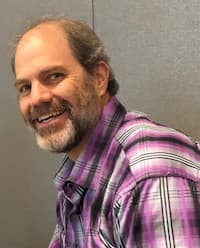
Brian Be
Section of Developmental Pediatrics, JFK Partners
University of Colorado Anschutz Medical Campus
A professional layman: My path to research
In 2010, I found out about a research study involving a brief assessment of adults which included determining whether research participants were on the autism spectrum. What were they researching? I couldn't tell you. I went for what I needed - a diagnosis. While there I got curious; why did I get missed? There's gotta be many more adults like me. What's happening with them/us?
This could be the end of the story because it was the genesis of my doorway into research, but I'm curious.
Not just pissed that I was missed (misdiagnosed), not just irate that the system is broken, but also genuinely curious about what is going on in the diagnosis and treatment systems and how might they improve? Might I help it improve?
The short version of my next steps began with forging social connections with the doctor who assessed me, by just stopping by to say hi. I stayed in touch there. I might need more from them. They might want me. Maybe I can help.
Fast forward 15 years and I'm a researcher there/here, among other roles, at JFK Partners in the School of Medicine. I think the smaller steps along the way are important to share because they're so 'non-traditional' for researchers. I went from research participant, answering questions, and transitioned to joining research teams and co-designing questions for others to answer.
Additional non-traditional steps into researcher included:
- Remembering people and trying to understand 'the system' a bit more. See where I may be involved.
- Community advisory board member, then co-chair
- Job coach at therapeutic horse riding ranch
- Help the teacher. Whenever in a class or at a project, support the lead people, learn & engage. Sweep the floor or hand out pencils - whatever helps.
- Leadership academy /classes: applying, taking on projects, networking; one major one was LEND (Leadership Education in Neurodevelopmental Disabilities).
- Others were Behavioral Health (NAMI & WE Can) & PLTI (FLTI)
- Community needs assessments
- Community guest speaker at LEND class, and at PA disability discussions - year after year; a known face & voice
- Caseworker / peer advocate worker
- Peer group facilitator (design curriculum & implement)
- Help Focus Groups happen
- Listen year after year at a clinical research didactic. I'm an artist; zany, oh and ADHD too, so non-linear. It often takes me 3 & 4 times to get it. I'm getting it.
Final thoughts:
Being researched has been historically exhausting for me. Too many questions, too little follow-up, too much sequencing, and going to unfamiliar places. Ugh.
Now in my role in research, I’m curious and involved in co-designing something more user-friendly.
For example:
- Not just asking for data but providing resources.
- Not just asking "are you married / single / divorced / dating / asexual / other ?" but providing relationship supports through websites, videos & phone hotlines.
- Researchers need to consider offering stipends at higher rates, days & times that are convenient for participants not just researchers, Meet people where they're at.
- Research well designed and well facilitated may be able to leave participants (and researchers too) smiling, perhaps even refreshed, more able - not just dry and exhausted.
My current research projects include:
- Study to Explore Early Development (SEED) Follow-Up Studies
- Birds & Bees – co-presenting these findings in November in Philly with other researchers
- Equality State Research Network (ESRN) - Wyoming rural health research group
Contact information:
Brian Be
Self-Advocacy Coordinator, JFK Partners
Brian.Bernard@cuanschutz.edu